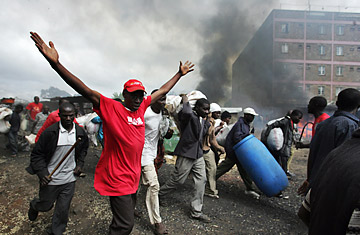
Looters make their way past a smoldering structure in the Kibera slum in Nairobi, Kenya in December of 2007.
Like most Kenyans, Rachel Kung'u takes a do-it-yourself approach to security. Last year, police did nothing when gangs went on a killing spree and blocked the main road into Nairobi during ethnic violence following the elections. Kungu had to face down the thugs herself. Eventually, she persuaded them to back off. "I told them, now that you blocked the road, food cannot go through, people cannot flee," Kung'u remembers. "They were starving their own people."
Twelve months later, Kenya's roads are clear but people like Kung'u fear that their leaders have no desire to confront the problems that led to the clashes, which saw ethnic groups turn on each other and forced more than 300,000 people to flee their homes. (The Dec. 27, 2007 vote saw President Mwai Kibaki edge out his rival, Raila Odinga, in balloting that was seen as rigged by both sides.) Damning evidence has emerged that Kenyan politicians plotted much of the violence that killed 1,200 people last January. This was done by offering cash to poor kids out in the countryside to kill or burn down houses of the politicians' enemies. It had been done before. Kung'u and a small band of colleagues think their leaders will do the same thing next time around. (See pictures of crisis in Kenya.)
To head off that possibility, Kung'u, her close associate Tony Otieno and their group of volunteers are again taking on responsibilities that ought to fall to the government. They hope by acting now, far in advance of the next presidential election in 2012, they might just keep chaos at bay.
Kung'u and Otieno believe the best way to take down the politicians' armies is to take away the cannon fodder. For them, it's a simple calculus: Get kids to reject a culture in which they must obey the commands of their elders. Then, get kids to start working so that the next time politicians come offering $15 for them to go kill someone from the wrong tribe, they stop and think about how much they have to lose. "We are trying to create that rebel mind, where you think on your own," says Kung'u. "If the young don't have an income by 2012, they will still be a threat — they will have nothing to lose," Otieno says. "Come 2012, the youth are going to weigh what they have gained from the politicians and what they have gained from their own sweat." (See pictures of Kenyan tribes waging war.)
Trauma from the election and fears of what's to come has fueled a deep skepticism among Kenyans, who almost universally believe that their leaders used them as pawns during that time. People belonging to most of Kenya's 42 ethnicities have horror stories from the chaos that followed. There was the rape victim who identified her attacker to police and was simply told to hire a gang and hunt the man down. A shopkeeper in Naivasha fled his home and later saw his attackers wearing the shoes he left behind. People starved to death in Nairobi slums because their businesses were destroyed. None of the killers of the 1,200 who died have been taken to court.
After the worst of the violence, Odinga and Kibaki created a coalition government, leaving Kenyans to wonder what they had been fighting for. On Monday, the Kenyan Red Cross said it was still feeding 250,000 people and that at least 100,000 were still living in refugee camps, now euphemistically called "transit camps." That does not include the thousands who still live with relatives and friends.
With so many still suffering, Kenyans are dubious that the country will properly reckon with what happened. Kenyan leaders have agreed to create a tribunal to prosecute the perpetrators, but rights groups say the proposed law creating it is so full of holes as to render the tribunal useless. "The real perpetrators and the real financiers will actually go scot-free," says Ruth Oniang'o, who runs a rural outreach program and lost in her bid for a parliamentary seat in 2007. "This is the Kenya I know and the Kenya I understand. Money and power talk, and those who don't have either continue to be victims."
Rachel Kung'u shares that cynicism. Her volunteer work has been hampered, in part, because she will no longer seek money from the government's youth development fund. Associating with the government would, she says, undermine her credibility with kids who are likely to do the fighting. "What we have always done is avoid working with the government," she says. "We are making a small difference now, but if we joined politics, they would change us into one of them or we would make no difference at all."
